DIFFERENT TYPE OF KITES
Times provoque changes, everything evolves and so do kites also, different types of kites, more efficient designs, improvements in the materials used, etc. Let’s see about this interesting concept and its obvious importance.

Inflatable or tube kites
Inflatable kites or tube are by far the most common, in any beach where you are practicing the sport of kitesurfing, you will see many of them, if not all.

Actually, the strong point of inflatable kites is that, although more problematic, because of the materials of which are manufactured, they have a somewhat more direct feel than kite foils, and especially in strong winds from 25 knots or higher and can give a greater sense of security by the way they are launched especially.
Kite foil type
Foil-type kites, in large sizes, are notably superior to inflatable kites in various aspects, as well as being practically indestructible, their weight is much lower which facilitates the navigation in gentle breezes.
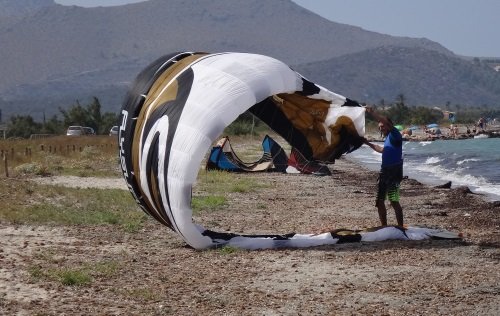
They are very efficient from an aerodynamic point of view because the wind flows equitably from the top as well as from the bottom of the kite and there is also no problem of punctures of the inner tube since they do not have that tubes, but interior cells which self-inflate as the wind fills the kite through the intercommunicated cells.
Its fabric is of much higher quality compared to the fabrics of inflatable type kites, because it must be light enough but at the same time, opaque enough to keep the air inside the kite, and when filled with the air that It arrives, there is no need for any pump to inflate them.
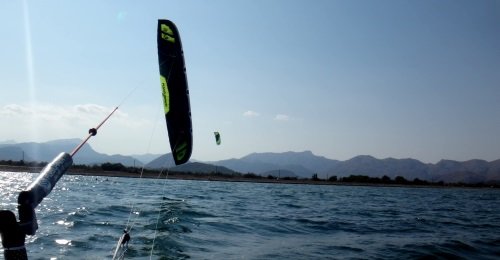
Authentic flying machines, kite foils, and of much more manufacturing complexity than tube kites, are more sophisticated and have a price somewhat higher than a kite tube, although in the long run its durability will compensate.
In spite of everything, with one type of kite or the other, the objective is the same, to get enough drag helped by the enormous traction they offer, although once you are controlling and improving your navigation style, what everyone wants is to jump, surf waves and do maneuvers during jumps.
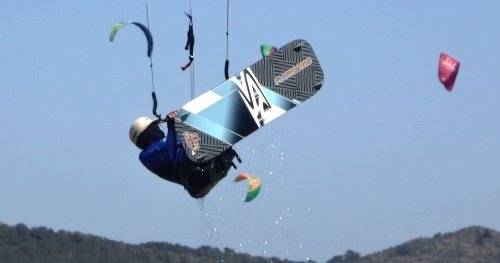
DIFFERENT TYPES OF KITES
Foilkites or tubekites … what to choose?
1.- The kite foils offer better performance in light winds, in addition to its more aerodynamic profile, its minimum weight acts in its favor with respect to the tube kites.
2.- The latest generation of kite foils offer a wide wind range for the same size.
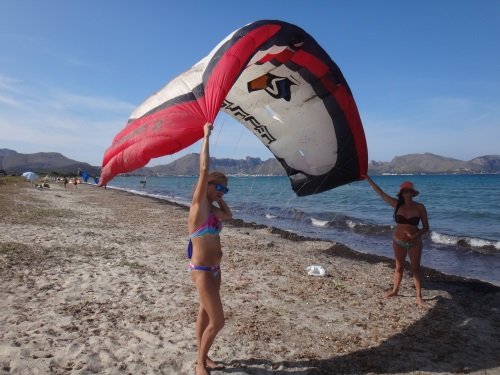
3.- The kite foils fly more towards the edge of the wind window so they will fly against the wind more effectively achieving a greater upwind angle.
4.- Best value for money when considering the extra time you are going to spend kitesurfing, especially if you are going to ride in light winds, it is definitively on the side of the foils. If the cost of the kite is divided by the number of hours that you will spend in the water, the cost per hour is much less than that of an inflatable kite.

buying tube kites can be more expensive than you originally thought … if they break down
5.- The volume of a kite foil once folded is much smaller and being also much lighter, it is easier to travel with them, since you can take more equipment when you go on vacation.
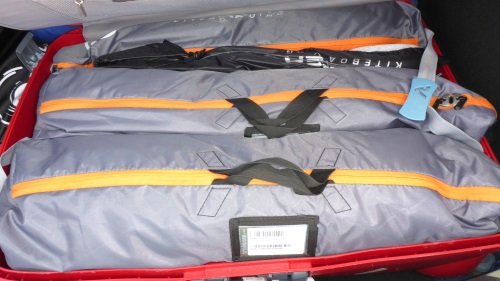
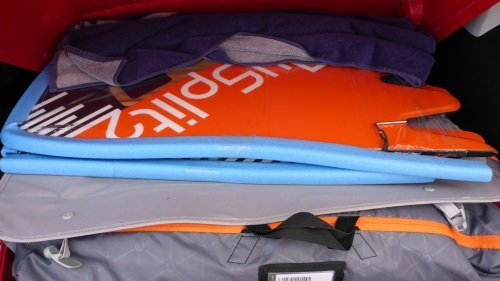
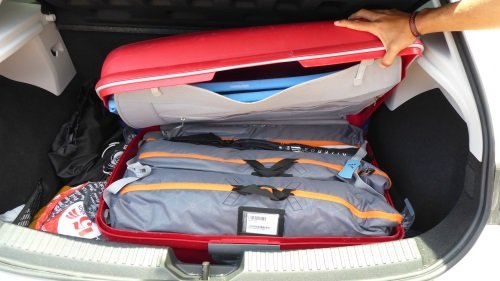
In the carry-on luggage, this time there are 3 Flysurfer Soul kites, 15, 12 mts and 8 mts, in the upper side of the suitcase a Flysurfer splitboard -divisible- of 134 × 41 plus harness and neoprene.
6.- The kite foils do not need a pump to inflate, they are self-inflatable, so you do not have to waste energy pumping and it takes less time to prepare and launch them.
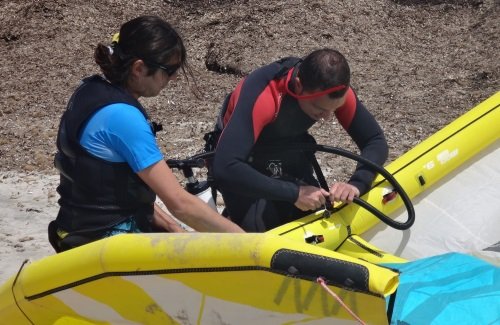
7.- There is no need to connect and disconnect the lines (although you can do it) since the foils are collected with the bar connected to the foil. This helps to avoid errors in the connection of the lines with the kite and reduces the time to go kitesurfing.
8.- No defective bladders to replace. When a bladder from a tube kite fails, it takes a while to find the air leak, fix and replace the bladder. A bladder usually lasts about 1 year but actually, they can fail and produce leaks at any time, which usually happens on the beach, when it is being inflated, or when you are already kitesurfing, and therefore … bye bye to the sailing.
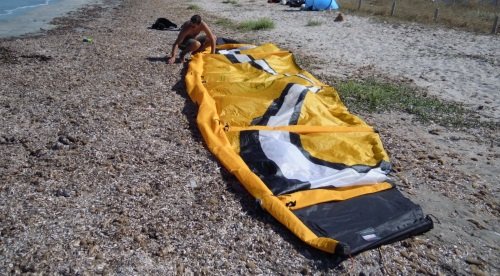
a tube kite needs to be inflated through an air pump
9.- You can leave the foil in the car permanently, this with the tube kites makes the valves of the bladders weaken with exposure to heat and finally the valve peel off.
10.- The foil kite must last a minimum of 8 or 10 years of regular use since there are no seams under pressure of inflated bladders. A tube kite with equivalent typical use will last about a quarter of that time.
11.- The lack of rigid structure means that it is difficult to break if we crash the kite against sand or water.
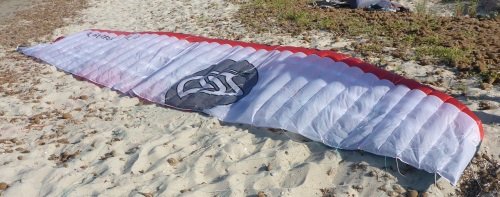
12.- The foils are much more interesting for use on land with carts or skateboards, and also in the snow, given its superior fabric resistence.
13.- Self-relaunch with kitefoils is much much easier.
14.- Flysurfer foils are aerodynamically more efficient than inflatable kites, thanks to their efficient design and bridle system, in addition to the absence of a rigid and heavy leading edge, which allows the kite to produce a more advanced and aerodynamic profile flatter and efficient than that of a tube kite, influencing its flight aerodynamics.
ADVANTAGES OF INFLATABLE KITES ON THE FOILS
1.- Tube kites are cheaper -but not that much indeed-
2.- Briddle tangles are quicker to solve.
3 .- If tube kites break, which can happen very easily, the repair is in principle simpler, although quite annoying.
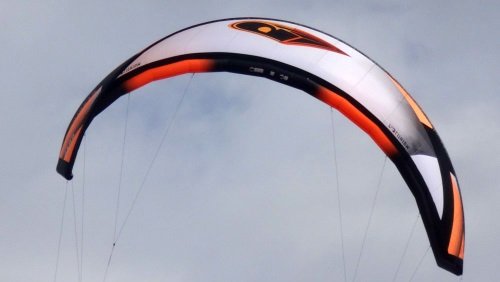
4.- They tend to have a higher speed on turns, for those who appreciate that particularity.
5.- The tube kite will always float … if the bladder does not explode when it hits the water, so, with the appropriate technique it can be more practical for rescue if we are far from the shore, although with light wind they can be very difficult to relaunch.
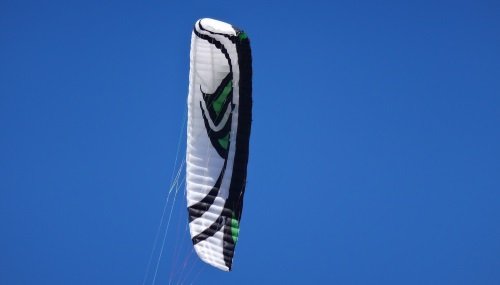
6.- A foil kite will retain enough air to re-launch from the water for 30 minutes or so, but with more time it will deflate although it will not sink – but you rarely sail so far from the shore as for this to happen. The new Flysurfer kites, the Soul model can float indefinitely as they are constructed of a water repellent material with 0 porosity.
7.- The tube kites, for wakestyle and unhooked tricks are the most used for their direct feel.
SIMILARITIES BETWEEN KITES
1.- By launching and landing the kite, both kites offer almost the same difficulty despite the technical differences and particularities of each type of kite.
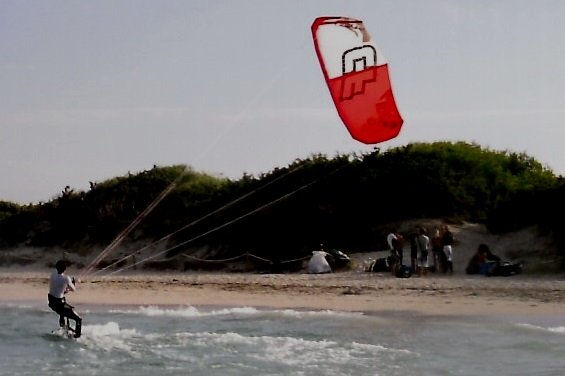
2.- A kite foil or tube kite, indistinctly, can offer the possibility of good airtime, high and maintained jumps, getting a good “boost” although in hangtime the kite foils are quite superior.
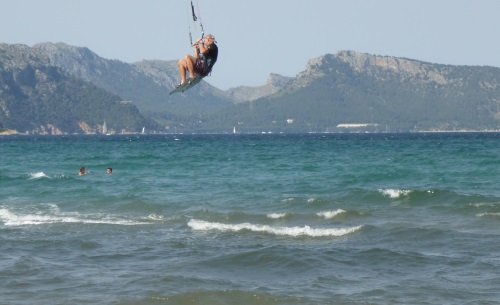
Tube kite jump
Different types of kites offer different sensations. A certain kite will offer some benefits in waves, others will be more interesting in doing tricks, and others offer more upwind ability.
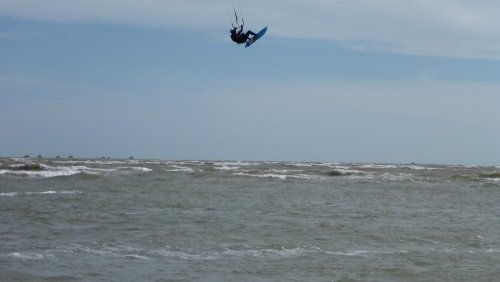
Flysurfer Sonic 11 mts – kite foil jump in 16 knots
The sensation of jumping and the “hangtime” offered by a foil kite Flysurfer Sonic or Soul models is unbeatable, that feeling mixes boost / hangtime to fifty percent, make them my favorite, especially in sizes over 10 meters.
3.- All kites currently offer 60/80% depower.
4.- When falling in a breaking wave both types of kite can experience problems, the tube in a wave acts mostly as a paper spoon while the foil kite will tend to stay more afloat, even so, in any case, if you drop the kite in a breaking wave and you want to avoid risks, it is best to pull the quick release. We might not be able to relaunch it again but at least, it will not suffer the drag and water pressure of a washing machine, so that on the shore, we should recover our kite safely
Do you want to learn Kitesurf in Vietnam?
Book your course at the best price
To contact the school click here

